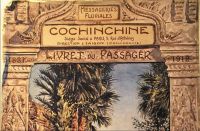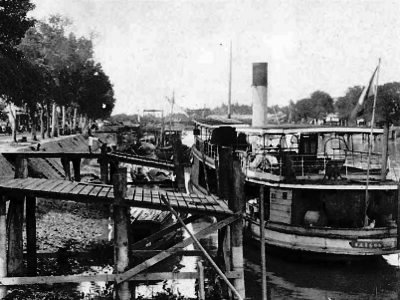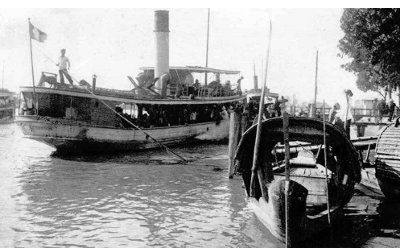
the River Shipping Company of Cochinchina, story of a monopoly - 1/3
Uncertain origins
The history of the Messageries takes us back to the 1870s, at a time when the French admiralty was supporting about three thousand troops in Cochinchina and when the Saigon port, then a little over fifty thousand inhabitants, was hosting the Colonial Council, which, before the time of Governor General Paul Doumer, was levying taxes from the indigenous population and employing them in a discretionary fashion. That is also to say, if you wanted to set up a trade in those times, you needed a real spirit of adventure and a strong will, or much political clout in this small pond.
Uncertain origins
The origin of the Messageries Fluviales de Cochinchine, the River Shipping Company of Cochinchina, depends on who tells the story.
The famous Roque brothers, Victor and Henri, who came from the province of Aveyron, in France1) but who had already been is Asia for awhile, were supplying the Cochinchina troops from the Philippines since 1857, and more so since the landing in Tourane2) in 1858. When the Admiralty called on private entrepreneurs to take part in the construction of the colony with the help of subsidies levied from the Indochinese population, Victor came and settled in Saigon in 1860, then had his brother Henri come along, and they partnered in 1870 with a Mr. Marcellin Larrieu to open the Steamer Shipping Company of Cochinchina3), which started trading the rivers between Saigon and Cambodia, at the time up to Kratie, the hightest point deemed navigable on the Mekong.
Several years later, after the failure of a project in railways, already towards Cambodia, Jules Rueff4) turned to the river, a much more natural communication way in the region, and founded the River Shipping Company of Cochinchina (Messageries Fluviales de Cochinchine) in 18815). The Messageries, the head office of which was in Paris, were from the start endowed with the largest capital in the colony (one and a half million francs), and were allocated since even before incorporation the subsidies that had been until then given to the Steamer Shipping Company, and a nine-year-contract ensuring the monopoly over mail shipping6). They took the upper hand on river transportation towards the Mekong delta and Cambodia.
The Roque brothers are often credited with the foundation of the Messageries Fluviales, although the statutes of the Messageries give its origin in 1881. Was it a common agreement? Did one of the Roque brothers come back to establish the Messageries with Rueff7)? Was it an example of the discretionary power the Colonial Council exerted in the wielding of its subsidies? The jungle never stopped at the entrance of the city.
Anyhow, many companies could envision their success only with the help of subsidies, and the granting of such subsidies often made for an uneven playing field. We could find no hint of the Steamer Shipping Company after 1882, and we meet the Roque brothers again far North in Tonkin as soon as a few years afterwards.
To be continued
We would love to hear from you if you know more about the Messageries. Please Contact us
This post is abstracted from a longer article: a XIXth Century Bassac
Pictures © http://belleindochine.free.fr/





